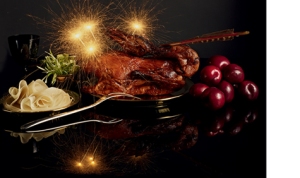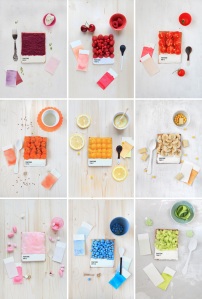Culinary Compositions
by Naina Singh
Every time I buy a latte, I look forward to the unique artistic formation that appears in the froth, created by the simple act of pouring steamed milk onto a shot of espresso. But every time, the aesthetic sense of delight is fleeting – soon the form simply disappears as I start to sip. It is this very concept of
transient delight that lends itself to almost all of food’s delightful creations. Though food can be presented in aesthetically pleasing ways, it is ultimately enjoyed through consumption, not critical visual contemplation.
Food, food preparation, and consumption have become media phenomena (can you remember the Food Network having hit shows 20 years ago?), and they speak to the visual appeal of the edible. The technology of recent years and new ways of communicating have created a culture of online “food sharing,” which captures the beauty of culinary creations through photography. It has become more and more common to witness frequent updates to social media about food – photos, in fact, of what people are eating – particularly if it has aesthetic appeal. No one (at least I hope not!) posts pictures of onion bagels or sauerkraut, but they do post pictures of say, the finest, most colorful macaroons.
I recently found an interesting feature in the Lifestyle section of Wallpaper Magazine called “Artist’s Palate.” In each issue, Wallpaperasks renowned

Beijing duck interpreted to imitate an artwork by Artist Cai Guo-Qiang’s. Photo courtesy of www.wallpaper.com.
artists from around the world to select a dish they enjoy or would like to be featured in the magazine. The dish, then, is presented in a manner that is reminiscent of the artist’s work or artistic style. A recipe, along with a short bio on the artist then accompanies photographs of his or her newly interpreted work.
For instance, Cai Guo-Qiang’s choice, Bejing duck, is enlivened by a stream of fireworks in reflection of his large-scale pyrotechnic performance art pieces. Bharti Kher’s Banana and saffron creamy frozen yogurt is presented in colorful concentric plates and bowls that echo her use of bindis (a tiny, decorative dot worn by Indian women on their foreheads) in many of her installations and paintings. Through these culinary compositions, Wallpaper has artfully captured many an artist’s palette, in addition to his or her palate.
As Wallpaper’s clever wordplay suggests, there is only a subtle difference between the orthography of palate and palette. In the kitchen, however, I would argue that culinary creations require both, and I won’t deny that the degree to which a chef satisfies both, the more artful and interesting the cuisine. Yet disproportionately so, for the palate is ultimately more important.
An example of a foodie who has mastered the weaving of beautiful design, color, graphics, and cooking is French artistic director and blogger, Emilie Griottes. On her blog, Griottes, categories are not sorted by content but rather by a palette of pastels. Each pastel is ascribed to a post relating to emotions, voyages, or cooking. Her posts on cooking, under Palette Culinaire, involve dreamy pictures of her kitchen exploits. Here, she continually brings out the beauty, delicacy, and colors entailed in her own art of cooking everything from edible Ferris Wheels to Fraises de Bois et Citron Vert tarts.
Though we see “food art” trends constantly evolving in every type of media, the satisfaction from food comes ultimate from the palate, not the palette. Thus, food certainly can be art but. Ultimately, though, we care more for the sensations of the tongue, less for the sensations of the eye when it comes to experiencing sensory enchantment brought on by a product of the kitchen.
And if it is colorful but not tasteful, with food as with art, we are not the least bit forgiving.
Links
http://www.wallpaper.com/lifestyle/artists-palate-cai-guo-qiangs/3634
http://www.wallpaper.com/lifestyle/artists-palate-bharti-kher/5239




Trackbacks & Pingbacks